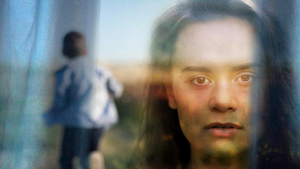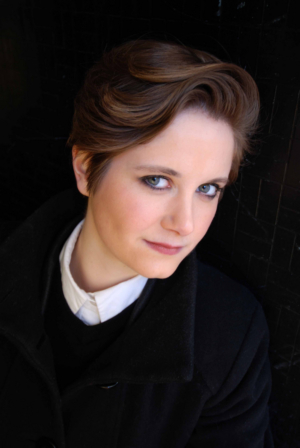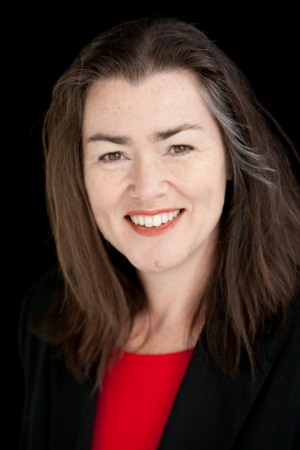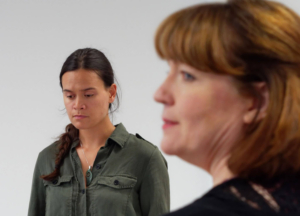Interview: Alice Kornitzer and Emma Kinane Talk ANAHERA at Finborough Theatre

Finborough Theatre are presenting the European premiere of Anahera, a new play by Emma Kinane. Directed by Alice Kornitzer, it sees a young Māori social worker supporting the parents of a missing child. We caught up with the playwright and the director.
How did you fall in love with theatre?
Alice: I grew up in a theatre family, so I was surrounded by it quite a lot. I remember being a small kid and my mum was having production meetings at our flat and stuff like that. Having said that, while I fell in love with it I didn't want to actually be in it. I had no ambition of working in the industry - that came a lot later. But theatre was always, from birth, part of my life. Either love it or hate it, I guess - in my case I loved it.
Emma: It's really interesting that you still fell in love with it, because so many second-generation artists I know don't want to be involved with it, because they know what it's really like. They've not fallen in love with the mystique or the romance of it. They know that sometime it's hard to pay rent.
Whereas me, I played Joan of Arc when I was seven. Looking back on it, it would have been a dreadful thing to have had to watch. But that's where it started for me. I didn't come from a theatre family at all, but my mum used to sing and be in choirs, and they would do amateur dramatics too. It's what I loved doing all the way through school, I just carried on.
Who are your influences?
Emma: I do acknowledge the big influence, in this particular play, of Pinter. He wrote a play called Betrayal, which I absolutely adore. One of the key things in this play is that it's told in reverse.
Alice: Pinter... You should have probably told me that before we started working on it! I would have read Betrayal before we started rehearsing!
Emma: Oh! I'm sorry!
Alice: Maybe I'll read it once we're done and I'll realise I would have directed it differently! "Had I known that..." Anyway, influences... I always find this really hard to answer. As an artist, I think I'm more influenced by life than other people's work. When it comes to technique, of course, there are some artists who you watch or read and you're immediately influenced by them because of how they approach the craft.
I grew up in Europe, and going off those early influences, since I used to work with the Berliner Ensemble, there's that sort of aesthetic that you might perceive. Or, indeed, my mother's work for that matter. There's an aesthetic that you become accustomed to, but it's more about feeling. If I can create that, it serves as a good benchmark.

Within that, there are also individuals that I've learnt a lot from, like Michael Longhurst. I wish I could think of more women, right now. As a writer, Winsome Pinnock is extraordinary. Influences are important because they open your mind to what a craft can serve and inspire you to think differently.
In what way do you think European theatre is different from British theatre?
Alice: Ha! The money and the time! It's a systemic difference. I don't think that work on either side of the Channel is better or worse; I think, however, that since the dismantling of funding in the arts in the 1980s under Thatcher, we've managed to manoeuvre ourselves into a corner as an industry. Not even by an outer pressure, but as an industry that deems acceptable working with enormous restraints. That's really problematic because anyone, regardless of what their job is, the only way they can develop fundamentally is by having time and resources.
That's different, for instance, in Germany. Everything has limitations and I certainly don't want to set up an idea that the grass is greener - there's a reason why I left! Over here we have more freedom with our work and we can be much more challenging with our work, because it's cheaper to do. I think, as an industry, what we're not doing well enough here, is to be a business.
After the finance sector, we create the second largest GDP in the UK and none of it goes back into the arts. If the three of us were business people sat in Singapore working out a deal, we'd think this is completely idiotic; it's not a contract anyone would sign - you'd get your percentage back in your sector. We haven't done that over here, which I don't understand at all. It's not like the demand and manpower aren't there, or that the money isn't there. It's just that it's badly used and distributed.
So, that's one of the upsides of working in Europe. But it's more elitist over there. And we can give ourselves a bit more credit for how quickly our British theatre industry is able to adapt and create issue work. That's also probably the other big difference: on the continent, theatres are much more concerned with creating an opus on stage, whether here we're much more focused on creating something that's vital and immediate. But we don't think about longevity that much, which is both a good and a bad thing.
When you work in repertoire in Europe, you work towards a show that has to run for many years. We don't have that pressure here; that set-up doesn't work. My job as a director in the room is to ask myself: will this still have air to breathe three weeks from now? Over there, they're probably thinking: three years from now, will it still be relevant? The world changes so quickly. It's a different way to look at how you produce something.
What about the differences between New Zealand and the UK? Do you think there are many?
Emma: One of the things I was interested in, the more I started observing rehearsals here, was that I was surprised that the language that we use is the same. I was surprised because even in New Zealand we tend to have differences. For instance, in Wellington we talk about "subtext" and that's the word we use in training, but in Auckland they use "hidden agenda".
Same thing, exactly the same thing, just different jargon. Even down to the fact that, even today, the actors call "Line?" in Wellington; in Auckland, they tend to say "Yes?". I was expecting there to be a lot more, but it's quite similar here. It's lovely to hear the words you guys use, and find out I didn't have to learn a whole new language.

What is Anahera about?
Emma: It's quite a tricky play to pin down, because I never want to give too much away. At its core, or rather, at the start of the play, it's the story of this 11-year-old boy who's gone missing. His parents are, obviously, distraught. They've reported it to the police and as part of that, a young Māori social worker - who's just graduated - goes in to support them. Because of another emergency situation she's left there on her own. Comedy ensues.
Alice: [Laughs] Sure, all of the laughs!
Emma: Basically, then, this young Māori woman starts to sense something and she trusts her gut. And she stands up for this family.
What kind of research went into writing and directing it?
Emma: Most of the research was about procedure. In terms of the family, that's all out of my brain.
Alice: Well, we'll never know how actually made up these characters are!
Emma: Don't tell my family!
Alice: We're lucky because we have actors from New Zealand, but the research that we had to go through is about translating it, essentially. It's a New Zealand play, written by a New Zealander in New Zealand, set in New Zealand... During prep I was asking myself, does it need translating for a British audience? The more I thought about it, the more I understood that it didn't need it.
Everyone grew up, everyone has a form of family, no matter what it looks like. Yes, it's very specific in the way the characters are drawn and the backdrop of that conflict. At the same time, there's an element of universal relevance to it because of the idea of family, psychology and trauma. There were bits of practical research - what kind of props we could feasibly have on stage, the setting - but it was never at the forefront of how much it related to us.
Emma: It just happens to be set in New Zealand.
Alice: The idea of cultural conflict and of values is a question of the 21st century. Particularly at the moment, because we live in a globalised world. There's inevitably going to be conflict.
Why does it need to be staged now?
Emma: This play would not let me put it down. I tried not to write it a few times, but it would not let me stop. It would haunt me at night until I started working on it again. Without tooting my own horn here, it feels important. I haven't tried to solve anything in it. What I've tried to do is go "Look. Just look!". It feels important, somehow.
Alice: It's not political, I would say it doesn't have any political commentary. It has a political backdrop. There's a societal conflict, perhaps, but it's resolved within people. When different cultures come together, there's inevitably going to be conflict of different natures at this point. I think what this play puts at the forefront at this day and age is the opening up of something via debate, via conversation.
It's a very dialogue-heavy play. It's pacy, quick, it has fantastic rhythm and it's very smart - the characters are intelligent. They're challenged - to the core of the confirmation of their biases and perceptions, of their beliefs. But it does that via debate, and brings it back to asking what does it mean to really connect with a person, warts and all?

during reharsals
None of the characters are 100% goodies or baddies - they're human. Through their being pushed to their very limit, they're forced to make decisions - and that happens through one-to-one conversations. This family is just not good at communicating. They think they are, but they're actually not. The more that's being pushed, the more it opens up.
I think that's why it's important, it reminds us that things can be solved through dialogue. It reminds us that change can happen in a world that tells us that change doesn't happen. It also brings redemption and hope back. I think we all need a little sign of hope.
So, what can the audience expect?
Emma and Alice, in unison: That!
Emma: An intense experience of redemption and hope at the end.
How would you like the audience to react?
Emma: I wrote it as a conversation starter. I deliberately have not resolved some things in the play because I wanted people to talk about it afterwards, to go to the bar afterwards...
Alice: And communicate!
Emma: Have an argument, have a debate.
Alice: Disagree with each other and hug afterwards! Don't be afraid to have an opinion, but also allow yourself to be changed. It's always easier said than done, but we do all hold the keys - we just get so used to holding onto the same one and shoving it into the wrong lock.
Hopefully, audiences will take with them a sense of less futility, of willingness to pick up the phone and start a conversation again, instead of sitting in anger - because that's really toxic.
Anahera runs at Finborough Theatre until 28 September
Comments
Videos

